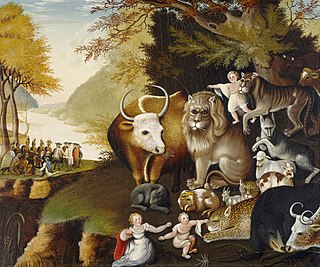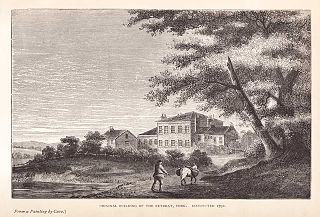
The views of Quakers around the world towards homosexuality encompass a range from complete celebration and the practice of same-sex marriage, to the view that homosexuality is sinfully deviant and contrary to God's intentions for sexual expression. The Religious Society of Friends (Quakers) is a historically Christian religious movement founded in 17th-century England; it has around 350,000 members. In Britain, Canada, New Zealand and Australia, many Quakers are supportive of homosexual relationships, while views are divided among U.S. meetings. The majority (52%) of Quakers live in Africa, and though views may differ, the Kenyan Church of Friends does not support homosexual relationships.

Mountmellick or Mountmellic is a town in the north of County Laois, Ireland. It lies on the N80 national secondary road and the R422 and R423 regional roads.

The Yearly Meeting of the Religious Society of Friends (Quakers) in Britain, also known as the Britain Yearly Meeting, is a Yearly Meeting of the Religious Society of Friends (Quakers) in England, Scotland, Wales, the Channel Islands and the Isle of Man. It is the national organisation of Quakers living in Britain. Britain Yearly Meeting refers to both the religious gathering and the organisation. "Yearly Meeting", or "Yearly Meeting Gathering" are usually the names given to the annual gathering of British Quakers. Quakers in Britain is the name the organisation is commonly known by.

William Tuke, an English tradesman, philanthropist and Quaker, earned fame for promoting more humane custody and care for people with mental disorders, using what he called gentler methods that came to be known as moral treatment. He played a big part in founding The Retreat at Lamel Hill, York, for treating mental-health needs. He and his wife Esther Maud backed strict adherence to Quaker principles. He was an abolitionist, a patron of the Bible Society, and an opponent of the East India Company's inhumane practices.

Samuel Tuke was a Quaker philanthropist and mental-health reformer. He was born in York, England.

Peace testimony, or testimony against war, is a shorthand description of the action generally taken by members of the Religious Society of Friends (Quakers) for peace and against participation in war. Like other Quaker testimonies, it is not a "belief", but a description of committed actions, in this case to promote peace, and refrain from and actively oppose participation in war. Quakers' original refusal to bear arms has been broadened to embrace protests and demonstrations in opposition to government policies of war and confrontations with others who bear arms, whatever the reason, in the support of peace and active nonviolence. Because of this core testimony, the Religious Society of Friends is considered one of the traditional peace churches.
The Ireland Yearly Meeting is the umbrella body for the Religious Society of Friends in Ireland. It is one of many Yearly Meetings (YM's) of Friends around the world.

The Retreat, commonly known as the York Retreat, is a place in England for the treatment of people with mental health needs. Located in Lamel Hill in York, it operates as a not for profit charitable organisation.

Quakers are people who belong to a historically Protestant Christian set of denominations known formally as the Religious Society of Friends. Members of these movements are generally united by a belief in each human's ability to experience the light within or see "that of God in every one". Some profess a priesthood of all believers inspired by the First Epistle of Peter. They include those with evangelical, holiness, liberal, and traditional Quaker understandings of Christianity. There are also Nontheist Quakers, whose spiritual practice does not rely on the existence of God. To differing extents, the Friends avoid creeds and hierarchical structures. In 2017, there were approximately 377,557 adult Quakers, 49% of them in Africa.

The Flushing Friends Quaker Meeting House, also the Old Quaker Meeting House, is a historic Quaker house of worship located at 137-16 Northern Boulevard, in Flushing, Queens, New York. It was declared a National Historic Landmark in 1967 and a New York City designated landmark in 1970. Today, it still serves as a Quaker Meeting, with meetings for worship taking place every Sunday.

Isaac Crewdson was a minister of the Quaker meeting at Hardshaw East, Manchester. He wrote A Beacon to the Society of Friends, a work published in 1835 which had a schismatic effect on English Quakerism.
Jonathan Pim was an Irish Liberal Party politician. He was elected as Member of Parliament (MP) for Dublin City at the 1865 general election, and held the seat until the 1874 general election, when his absence abroad when the election was called unexpectedly made it impossible to mount an effective campaign. He was president of the Statistical and Social Inquiry Society of Ireland between 1875 and 1877. A Quaker, he served as secretary for the Quaker Relief fund during the Great Irish Famine: the work involved was so exhausting that he suffered a temporary collapse of health. Nonetheless he retained a lifelong interest in efforts to alleviate the poverty-stricken condition of the Irish. Under his guidance the family firm, Pim Brothers, opened a pioneering department store in South Great George's Street in Dublin city centre. He had a reputation for being an especially generous employer. He is buried in the Friends Burial Ground, Dublin in Blackrock, Co. Dublin.

The Friends Burial Ground, also called Temple Hill Burial Ground or the Friends Sleeping Place is a Quaker burial ground located at Temple Hill, Blackrock, Dublin. It opened in 1860 and is one of only two Quaker burial grounds in Dublin; the other being at Cork Street.
The American Friends Service Committee (AFSC) is a Religious Society of Friends (Quaker) founded organization working for peace and social justice in the United States and around the world. AFSC was founded in 1917 as a combined effort by American members of the Religious Society of Friends to assist civilian victims of World War I. It continued to engage in relief action in Europe and the Soviet Union after the Armistice of 1918. By the mid-1920s it focused on improving racial relations in the U.S., as well as exploring ways to prevent the outbreak of another conflict before and after World War II. As the Cold War developed, it moved to employ more professionals rather than Quaker volunteers, over time attempting to broaden its appeal and respond more forcefully to racial injustice, women's issues, and demands of sexual minorities for equal treatment. They also work for world peace.

Ruth Margaret Cadbury is a British Labour Party politician serving as the Member of Parliament (MP) for Brentford and Isleworth since 2015, and the Shadow Minister for Planning since 2021. A former planning consultant, she previously served on the opposition front bench as the Shadow Minister for Housing from 2016 to 2017.

Pim Brothers & Co. was part of the interests of the Pim Brothers, business entrepreneurs based in Dublin in the first half of the nineteenth century.
The Religious Society of Friends (Quakers) have a long history in Ireland; their first recorded Meeting for Worship in Ireland was in 1654, at the home of William Edmundson, in Lurgan.
James Pim was the key person to the establishment and operation of the first passenger railway in Ireland, the Dublin and Kingstown Railway (D&KR), and the first commercial atmospheric railway in the world, the Dalkey Atmospheric Railway.
Sir John Barrington JP DL Kt (1824–1887), was an Irish businessman who served as Lord Mayor of Dublin in 1865 and again in 1879. He was a member of the Irish Conservative Party. He was born on September 6, 1824 to Edward Barrington of Fassaroe, County Wicklow, and Sarah Leadbeater from Ballitore, County Kildare. He was the great-grandson of John Barrington, a tallow candler who founded the John Barrington & Sons company that made soap at their premises on Great Britain St. (now Parnell St.
Samuel Bewley was an Irish businessman, silk merchant and philanthropist. Along with his son Charles, he founded the company Bewley's.













